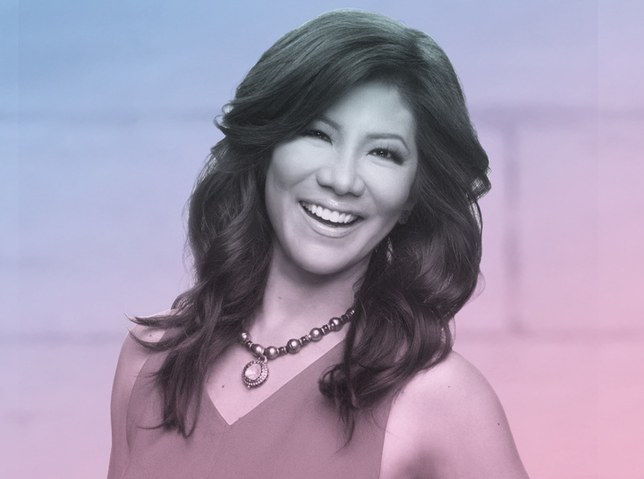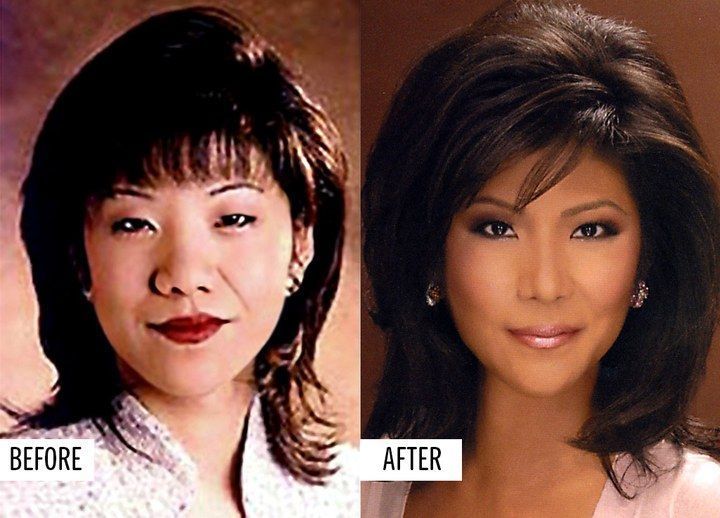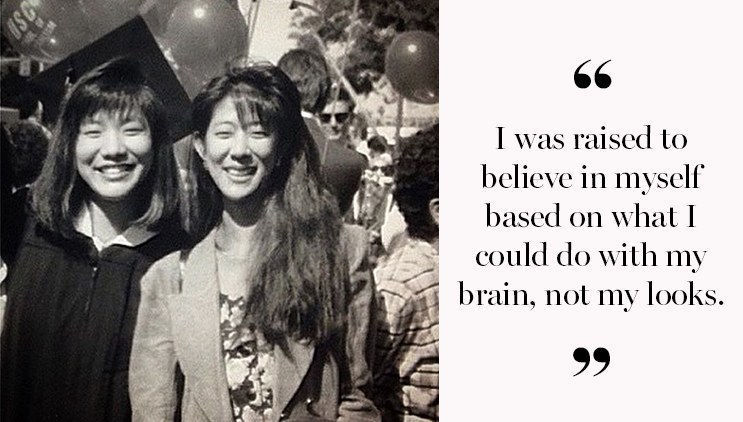“I Was Told I’d Never Make It As a News Anchor Because I Looked Too Chinese”

Three years ago during The Talk‘s season premiere week, moderator and co-host Julie Chen dropped a bombshell that when she was a young reporter working in Ohio, she had cosmetic surgery on her eyes. Her decision to do so came at the suggestion of an agent and news director who told Chen she’d never make it as a top news anchor if she didn’t alter her appearance. They told her the shape of her monolid eyes often made her look “disinterested.” More specifically, her director said, “You’ll never make it on this anchor desk because you’re Chinese … Our audience can’t relate to you because you’re not like them.”
“All I could see was my eyes [after that],” Chen said. “And [I wondered] does he have a point?” Eventually, the criticism cut so deep that Chen decided to move forward with a blepharoplasty (a.k.a. double eyelid surgery), an extremely painful procedure done in two parts over a couple of years.
Chen had the surgery when she was 25, but never spoke of it until her early 40s, when she revealed on The Talk that “it felt like a grown-up version of racism in the workplace.” Now, at 46, she’s opening up exclusively to Glamour about the reaction she’s received since going public about her decision, whether she’d do anything differently today, and what she wants young women to know about their own beauty.

Since I first revealed my surgery on The Talk, the reaction from the Asian community—specifically from Asian women—has been tremendous. Many told me they finally felt free from feeling shamed. Others told me they wanted to get it done, but it felt like it was a dirty little secret people in the Asian community didn’t discuss, especially with non-Asians, and even with their own family. I had one sister and one aunt who thought it was denying my heritage. It was considered shameful. A disappointment. Then there were women in non-Asian communities who were flabbergasted that this was such a thing. It was very, no pun intended, eye-opening.
I know Barbra Streisand, and she was fascinated by this story. She was interested in finding out more details, beyond what I said on the show. Each time I was asked about the surgery, I was more than happy to inform and educate, because my reason for getting it had everything to do with my job.
Barbra seemed to understand it. She equated it to her nose…like, yeah, you look better, but is it going to change the way you sing? Is it going to change the way you sound? Look at Jennifer Grey. Some say her nose job hurt her career because she didn’t look like herself anymore. Sure, she was “prettier” after the nose job, but she was cuter and more unique-looking before it. It’s hard to compete with pretty in Hollywood because there’s a lot of pretty actresses. But finding cute is harder…especially cute actresses that act and do comedy! She had both.
I first remember hearing about the surgery when I was around 13. I would go to Singapore every other summer to visit my relatives on my mom’s side. There are always some aunties who are like, ‘Her eyes are too small, there’s surgery that you can do.’ And in these Asian cultures, especially one like Singapore that is so advanced and modern and Western, it was something that was already being practiced.
I remember one cousin telling me, “You can see how you look by putting scotch tape over your eyelids. If you cut a piece of tape to the shape of your upper eyelid, then tape it as close to your lash line as possible, it forces your eyelid to crease and opens up your eye.” It’s kind of like flipping your lid. I remember trying that as a kid. It made a huge difference—as in, I thought I looked freaky! My eyes looked much bigger, and I looked more “alive” and “interested.” But I didn’t look like me. And I didn’t necessarily look prettier.
Having the surgery was not thought of again until an agent flat out said, “If you get this surgery, you’ll get into a top 10 market. If you don’t get the surgery, you won’t.” I was in Dayton, Ohio then, which was market 52 at that point, I think. Today, people want to know why I didn’t go after that news director for telling me to physically alter my appearance. Well, I was 25, and I wasn’t going to stage a lawsuit against the corporation, especially at that time. You have to remember I was looking at someone who was an expert and a success in the field, who was giving me advice—not holding a gun to my head—and saying it’s your choice.

Chen (left) and her sister, Victoria, at Julie’s USC college graduation.
I was raised to believe in myself based on what I could do with my brain, not my looks. That’s why initially I was surprised to hear the agent recommend the surgery. I felt naive. After much thought and discussing it with my parents, I made the decision to do it.
I didn’t feel unattractive before I got it done. I wasn’t a beauty queen, but I wasn’t a horror show either. I got the surgery not to look better, but to look more interested and engaged when I’m interviewing someone on TV. The benefit was that I did look better, at least by societal standards.
But what I really learned from it is that confidence and a winning personality are always attractive, and now I’m happier and more comfortable with how I look—for a number of reasons. One, I’m more mature, so I’m more comfortable in my own skin. The only thing I don’t like is the sunspots on my cheeks. I think, “I should have worn that sunscreen when I was younger!” I want smooth, even skin—the same pigmentation throughout. I’ve also noticed that as I’ve gotten older, my eyebrows have begun thinning, and I can’t say I’m a fan of that.
Oddly enough, when I look at pictures of myself without makeup on, I always think I look better than I thought I did. When I go out without makeup on, I feel confident about it now. I’ll Instagram pictures without makeup, whereas eight years ago, I would never have dreamed of that. But now I actually kind of like the way I look without makeup better.
To this day, I have no regrets about the surgery. I don’t live my life with regrets. I stand by my decisions and any bad ones I have made, I learn from them. The surgery doesn’t define who I am; it’s just a chapter in my life. It didn’t change who I am or how I live. I don’t look in the mirror and see a different person who I don’t recognize. I’m just me—and I feel good about that.
—As told to Jessica Radloff
The seventh season of The Talk just kicked off on CBS. Tune in to see hosts Julie Chen, Aisha Tyler, Sharon Osbourne, Sara Gilbert, and Sheryl Underwood discuss more deeply personal stories.

